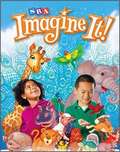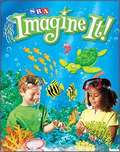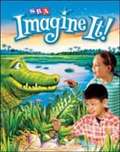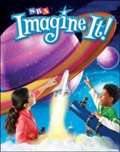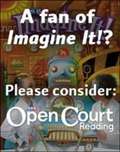- Table View
- List View
SRA Imagine It! Let's Talk About Credit Cards
by Sra Mcgraw-HillImagine It! is a comprehensive Reading and Language Arts program that will teach your children to read, write, and think independently!
SRA Imagine It! Level 1-Book 2 (Home, Sweet Home and I Am Brave)
by Sra Mcgraw-HillLiterature Anthology textbook for First Grade
SRA Imagine It! Level 3 Book 2 (Themes: Earth, Moon, and Sun; Communities across Time; Storytelling)
by Sra Mcgraw-HillLiterature Anthology for 3rd Grade
SRA Imagine It! Odd Friendships
by Sra Mcgraw-HillImagine It! is a comprehensive Reading and Language Arts program that will teach your children to read, write, and think independently!
SRA Imagine It! Quarters of the Fifty States
by Sra Mcgraw-HillImagine It! is a comprehensive Reading and Language Arts program that will teach your children to read, write, and think independently!
SRA Imagine It! Savannah Homeland
by Sra Mcgraw-HillImagine It! is a comprehensive Reading and Language Arts program that will teach your children to read, write, and think independently!
SRA Imagine It! Skills Practice, Workbook, Level 3, Book 1 (California)
by Sra Mcgraw-HillNIMAC-sourced
SRA Imagine It! The Oldest City in Our Country
by Sra Mcgraw-HillImagine It! is a comprehensive Reading and Language Arts program that will teach your children to read, write, and think independently!
SRA Imagine It! Why Days Are Longer in the Summer
by Sra Mcgraw-HillImagine It! is a comprehensive Reading and Language Arts program that will teach your children to read, write, and think independently!
SRA Imagine It!, A Gift from Mexico
by Sra Mcgraw-HillImagine It! is a comprehensive Reading and Language Arts program that will teach your children to read, write, and think independently!
SRA Imagine It!, A New Friend
by Sra Mcgraw-HillImagine It! is a comprehensive Reading and Language Arts program that will teach your children to read, write, and think independently!
SRA Imagine It!, Challenge Activities, Blackline Masters, Level 3 (California)
by Sra Mcgraw-HillImagine It! is a comprehensive Reading and Language Arts program that will teach your children to read, write, and think independently!
SRA Imagine It!, Dollars for Pesos
by Sra Mcgraw-HillImagine It! is a comprehensive Reading and Language Arts program that will teach your children to read, write, and think independently!
SRA Imagine It!, Franklin's Friend
by Sra Mcgraw-HillImagine It! is a comprehensive Reading and Language Arts program that will teach your children to read, write, and think independently!
SRA Imagine It!, No Walls in Friendship
by Sra Mcgraw-HillImagine It! is a comprehensive Reading and Language Arts program that will teach your children to read, write, and think independently!
SRA Imagine It!, Pet Friends
by Sra Mcgraw-HillImagine It! is a comprehensive Reading and Language Arts program that will teach your children to read, write, and think independently!

